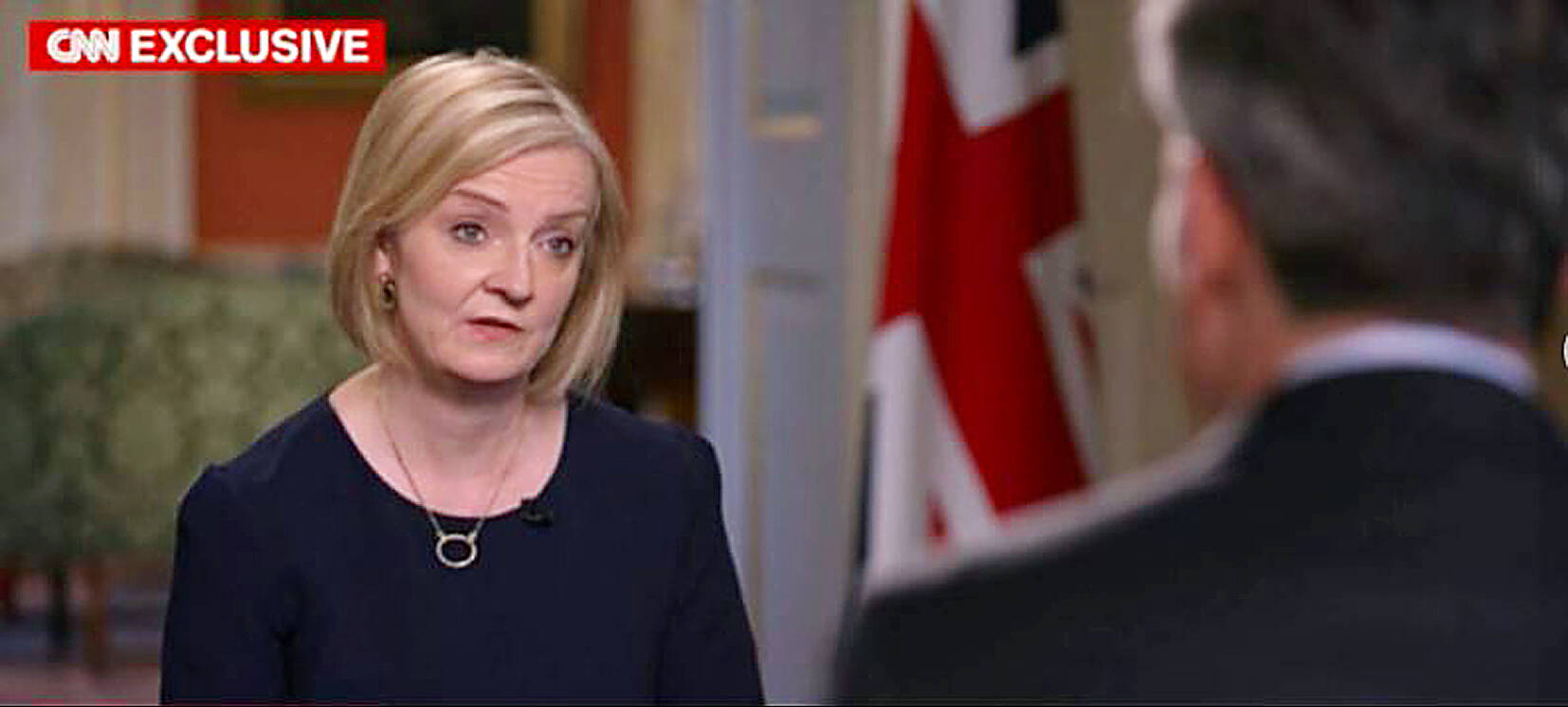The UK is determined to work with its allies to ensure that Taiwan can defend itself, British Prime Minister Liz Truss said on Sunday, a pledge that drew expressions of gratitude from Taipei.
“What I’ve been clear about is that all of our allies need to make sure Taiwan is able to defend itself, and that is very, very important,” Truss said in a CNN interview, when asked whether the UK was willing to match the US’ pledge last week to defend Taiwan militarily in the event of an attack by China.
Truss said her government was working with its G7 allies, including the US, Japan and Canada, to reduce “strategic dependency” on China and to ensure they have a “common response” to the threat of Beijing’s military aggression.

Photo: screen grab from CNN
“We need to learn the lessons from Ukraine,” she said, referring to Russian President Vladimir Putin’s invasion of the nation.
“The fact is, the free world didn’t do enough to counter Russian aggression early enough and Putin was emboldened to start this appalling war, and we can’t see that situation happen in other parts of the world,” Truss said.
CNN host Jake Tapper raised the Taiwan situation with Truss after US President Joe Biden the previous Sunday in a television interview said that US forces would defend Taiwan “if in fact there was an unprecedented attack.”
Asked about Truss’ remarks, Ministry of Foreign Affairs spokeswoman Joanne Ou (歐江安) said that Taiwan is grateful to Truss for her pledge, and for continuing to stand with Taiwan.
When the prime minister was British secretary of state for foreign, Commonwealth and development affairs she also expressed support for Taiwan on several occasions, Ou said.
In a speech in April, Truss called on NATO to be ready to tackle global threats by working with Japan and Australia to ensure order in the Pacific.
“We must ensure that democracies like Taiwan are able to defend themselves,” she said in the speech.
When US House of Representatives Speaker Nancy Pelosi made a controversial visit to Taiwan last month, Truss said it was “well within her rights as speaker of Congress to visit the island’s capital, Taipei.”
The issue most worth considering was China’s military drills held around Taiwan in response to the visit, Truss said.
Ou yesterday said that Taiwan would continue working closely with the UK and other like-minded nations to jointly “resist authoritarian expansion and aggression,” and to safeguard a free and open Indo-Pacific region.

CHAOS: Iranians took to the streets playing celebratory music after reports of Khamenei’s death on Saturday, while mourners also gathered in Tehran yesterday Iranian Supreme Leader Ayatollah Ali Khamenei was killed in a major attack on Iran launched by Israel and the US, throwing the future of the Islamic republic into doubt and raising the risk of regional instability. Iranian state television and the state-run IRNA news agency announced the 86-year-old’s death early yesterday. US President Donald Trump said it gave Iranians their “greatest chance” to “take back” their country. The announcements came after a joint US and Israeli aerial bombardment that targeted Iranian military and governmental sites. Trump said the “heavy and pinpoint bombing” would continue through the week or as long

TRUST: The KMT said it respected the US’ timing and considerations, and hoped it would continue to honor its commitments to helping Taiwan bolster its defenses and deterrence US President Donald Trump is delaying a multibillion-dollar arms sale to Taiwan to ensure his visit to Beijing is successful, a New York Times report said. The weapons sales package has stalled in the US Department of State, the report said, citing US officials it did not identify. The White House has told agencies not to push forward ahead of Trump’s meeting with Chinese President Xi Jinping (習近平), it said. The two last month held a phone call to discuss trade and geopolitical flashpoints ahead of the summit. Xi raised the Taiwan issue and urged the US to handle arms sales to

BIG SPENDERS: Foreign investors bought the most Taiwan equities since 2005, signaling confidence that an AI boom would continue to benefit chipmakers Taiwan Semiconductor Manufacturing Co’s (TSMC, 台積電) market capitalization swelled to US$2 trillion for the first time following a 4.25 percent rally in its American depositary receipts (ADR) overnight, putting the world’s biggest contract chipmaker sixth on the list of the world’s biggest companies by market capitalization, just behind Amazon.com Inc. The site CompaniesMarketcap.com ranked TSMC ahead of Saudi Aramco and Meta Platforms Inc. The Taiwanese company’s ADRs on Tuesday surged to US$385.75 on the New York Stock Exchange, as strong demand for artificial intelligence (AI) applications led to chip supply constraints and boost revenue growth to record-breaking levels. Each TSMC ADR represents

Pro-democracy media tycoon Jimmy Lai’s (黎智英) fraud conviction and prison sentence were yesterday overturned by a Hong Kong court, in a surprise legal decision that comes soon after Lai was jailed for 20 years on a separate national security charge. Judges Jeremy Poon (潘兆初), Anthea Pang (彭寶琴) and Derek Pang (彭偉昌) said in the judgement that they allowed the appeal from Lai, and another defendant in the case, to proceed, as a lower court judge had “erred.” “The Court of Appeal gave them leave to appeal against their conviction, allowed their appeals, quashed the convictions and set aside the sentences,” the judges